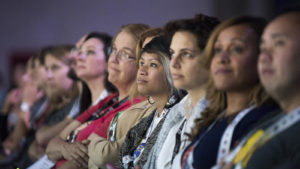Cheryl V. Jackson, Blue Sky Innovation
L ‘Shon Anthony is on a mission, traversing the Chicago area to get in front of tech-focused groups of women at universities, as well as companies that want to help boost the numbers of women in the field.
‘Shon Anthony is on a mission, traversing the Chicago area to get in front of tech-focused groups of women at universities, as well as companies that want to help boost the numbers of women in the field.
Anthony is building out the Chicago chapter of the Anita Borg Institute for Women in Technology, a nonprofit focused on narrowing tech’s gender gap.
ABI.Chicago launched in 2015, and Anthony began hitting groups and businesses for volunteers and sponsorships in fall 2016.
“I’m finding that there are a lot of people who are looking for a connection within the tech industry that they aren’t finding, myself in particular,” said Anthony, who also owns a web design company called Visuals4u. “The times I would go out to tech events, they were heavily attended by men.”
Computer scientist and Chicago native Anita Borg founded the organization in 1997 as the Institute for Women and Technology. She created an early online community for women in the 1980s, and as an advocate for women in tech, her accomplishments included an appointment by President Bill Clinton to a national commission on women in science, engineering and technology. She died in 2003.
The nonprofit institute, now based in Palo Alto, Calif., focuses on the advancement of women in the field — including underrepresented minorities and LGBTQ people. Its main event is the annual Grace Hopper Celebration of Women in Computing, a conference that drew 15,000 participants in 2016.
The institute set up its first local chapters in New York and Delhi, India in 2014. It followed with Chicago and eight other areas in 2015. It since has grown to 20 communities worldwide, including Tokyo, Amsterdam, Portland and Africa.
So far, the Chicago chapter has produced programs at a rate of about once a month, including coding classes, panel discussions on careers in tech, and a remote viewing party for locals to watch the Grace Hopper Celebration.
More recently, it hosted a pair of networking events and panel discussions tied to screenings of the movie “Hidden Figures,” about a trio of black women mathematicians who were the brains behind NASA’s launch of John Glenn in to orbit.
Anthony expects events to become more frequent as more partners have joined the cause. Morningstar sponsored the “Hidden Figures” screenings, and the DePaul University Coleman Entrepreneurship Center is a new partner.
Anna Mukhina, a senior software engineer at Morningstar, said a women in technology employee group at her company linked with the local chapter after sending a members to the Grace Hopper event — only half as many as they wanted, because tickets sold out within minutes, she said.
The Morningstar group reached out to Anthony, who told them about offerings locally, as well as national initiatives, including a framework that helps organizations score their diversity efforts.
“We thought, ‘This is a really strong organization to continue to work with,’ ” Mukhina said.
Going into 2017, it plans offer a broader array of programs, including tutorials, seminars and daylong boot camps in topics ranging from virtual reality to cybersecurity, financial technology and gaming, Anthony said.
The chapter has more than 100 members, and non-members can also attend events, Anthony said. Membership is free and men are welcome.
“I knew with this organization, we would be able to highlight the fact that women have a place in the industry and are doing things every day, and folks would be able to see a path and be able to find mentors,” she said.
The Anita Borg Institute started local chapters to bring people together outside the Grace Hopper Celebration, according to Elizabeth Ames, the national organization’s senior vice president of marketing, alliances and programs.
“We wanted to being a little piece of that to people where they are, and just to continue that feeling of feeling inspired and knowing you’re not the only person like that out there,” Ames said. “A lot of them go back into their local communities, and they don’t have that kind of local connection.”
Cheryl V. Jackson is a freelance writer
Twitter @cherylvjackson


Recent Comments